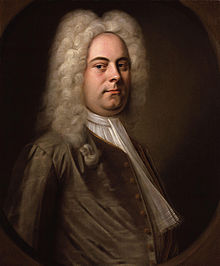- Alexander's Feast (Handel)
-
Alexander's Feast (HWV 75) is an ode with music by George Frideric Handel set to a libretto by Newburgh Hamilton. Hamilton adapted his libretto from John Dryden's ode Alexander's Feast, or the Power of Music (1697) which had been written to celebrate Saint Cecilia's Day. Jeremiah Clarke (whose score is now lost) set the original ode to music.
Handel composed the music in January 1736, and the work received its premiere at the Covent Garden Theatre, London, on 19 February 1736. In its original form it contained three concertos: a concerto in B flat major in 3 movements for "Harp, Lute, Lyrichord and other Instruments" HWV 294 for performance after the recitative Timotheus, plac'd on high in Part I; a concerto grosso in C major in 4 movements for oboes, bassoon and strings, now known as the "Concerto in Alexander's Feast" HWV 318, performed between Parts I and II; and an organ concerto HWV 289 in G minor and major in 4 movements for chamber organ, oboes, bassoon and strings performed after the chorus Let old Timotheus yield the prize in Part II. The organ concerto and harp concerto were published in 1738 by John Walsh as the first and last of the Handel organ concertos Op.4. Handel revised the music for performances in 1739, 1742 and 1751. Donald Burrows has discussed Handel's revisions to the score.[1][2]
The work describes a banquet held by Alexander the Great and his mistress Thaïs in the captured Persian city of Persepolis, during which the musician Timotheus sings and plays his lyre, arousing various moods in Alexander until he is finally incited to burn the city down in revenge for his dead Greek soldiers.
The piece was a great success and it encouraged Handel to make the transition from writing Italian operas to English choral works. The soloists at the premiere were the sopranos Anna Maria Strada and Cecilia Young, the tenor John Beard, and a bass called Erard (first name unknown).
Contents
Structure of the work
- Part one:
- Overture
- Recitative (tenor): 'Twas at the royal feast
- Aria and chorus: Happy, happy pair
- Recitative: Timotheus plac'd on high
- Harp Concerto, Opus 4, Number 6 in B Flat
- Recitative: The song began from Jove
- Chorus: The list'ning crowd
- Aria (soprano): With ravish'd ears
- Recitative: The praise of Bacchus
- Aria and chorus: Bacchus ever fair and young
- Recitative: Sooth'd with the sound
- Recitative: He chose a mournful muse
- Aria (soprano): He sung Darius, great and good
- Recitative: With downcast looks
- Chorus: Behold Darius great and good
- Recitative: The mighty master smil'd
- Arioso: Softly sweet in Lydian measures
- Aria: War, he sung, is toil and trouble
- Chorus: The many rend the skies with loud applause
- Aria: The prince, unable to conceal his pain
- Chorus: The many rend the skies with loud applause
- Part two:
- Recitative and chorus: Now strike the golden lyre again
- Aria (bass): Revenge, Timotheus cries
- Recitative: Give vengeance the due
- Aria: The princes applaud with a furious joy
- Aria and chorus: Thais led the way
- Recitative: Thus long ago
- Chorus: At last divine Cecilia came
- Recitative: Let old Timotheus yield the prize
- Chorus: Let old Timotheus yield the prize
- Organ concerto, Opus 4 Number 1
- Chorus: Your voices tune
Recordings
- Alexander's Feast or The Power of Musick, HWV 75: Honor Sheppard, soprano; Max Worthley, tenor; Maurice Bevan, bass; Oriana Concert Choir & Orcehstra, conducted by Alfred Deller; Recorded 1964 (Authentic Instruments) — 2 LP Bach Guild BG-666--BG-667
- Alexander's Feast or The Power of Music, HWV 75: Felicity Palmer, soprano; Anthony Rolfe Johnson, tenor; Stephen Roberts, bass; Stockholm Bach Choir & Concentus Musicus Wien, conducted by Nikolaus Harnoncourt; Recorded 1977 (Authentic Instruments) — 2 LP Teldec 6.35440 [1978] — 2 CD Teldec 6 3984-26796-2 6 [2000]
- Alexander's Feast or The Power of Music,: Helen Donath, soprano-1; Sally Burgess, soprano-2; Robert Tear, tenor; Thomas Allen, baritone; Choir of King's College, Cambridge & English Chamber Orchestra, conducted by Philip Ledger; Recorded 1978 (Modern Instruments) at King's College Chapel - 2 LP EMI 1C 157 03 404/5 [1979] — 2 CD Virgin Classics, (as part of 5-CD boxset:) Virgin Classics 5 62118 2 [2003])
- Alexander's Feast: Donna Brown, soprano; Carolyn Watkinson, contralto; Ashley Stafford, countertenor; Nigel Robson, tenor; Stephen Varcoe, bass; Monteverdi Choir & English Baroque Soloists, conducted by John Eliot Gardiner; Recorded live in 1987 (Authentic Instruments) at the Stadthalle Göttingen - 2 CD Philips 422 053-2 [1988], Philips 00289 475 777-4 [2006]
- Alexander's Feast: Nancy Argenta, soprano; Ian Partridge, tenor; Michael George, bass; The Sixteen, conducted by Harry Christophers; Recorded 1990 (Authentic Instruments) - 2 CD Collins Classics 70 162 [1991], Musical Society Heritage 525259X [1998], Coro COR16028 [2004]
Alexander's Feast today: performances and recordings
The soprano aria War, he sung, is toil and trouble was featured in Alfonso Cuaron's film Children of Men.
References
E-book
- Score of Alexander's Feast (ed. Friedrich Chrysander, Leipzig 1861)
External links
- Full-text libretto hosted by Stanford University.
Categories:- 1736 works
- 1736 in music
- 1736 in England
- Oratorios by George Frideric Handel
Wikimedia Foundation. 2010.

